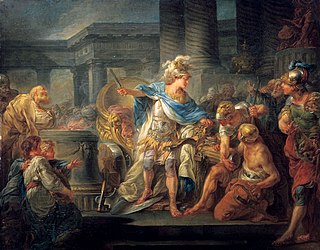
Nicomedes I, second king of Bithynia, was the eldest son of Zipoetes I, whom he succeeded on the throne in 278 BC.

The Gordian Knot is an Ancient Greek legend of Phrygian Gordium associated with Alexander the Great. It is often used as a metaphor for an intractable problem solved easily by finding an approach to the problem that renders the perceived constraints of the problem moot :

Justin was a Latin writer who lived under the Roman Empire.

Gnaeus Pompeius Trogus(fl. 1st century BC), also anglicized as Pompey Trogue, was a Gallo-Roman historian from the Celtic Vocontii tribe in Narbonese Gaul who lived during the reign of the emperor Augustus. He was nearly contemporary with Livy.
Ziaelas, third king of Bithynia, was a son of Nicomedes I and Ditizele.

Apollodotus I Prakrit in the Kharoshti script: maharajasa apaladatasa tratarasa) was an Indo-Greek king between 180 BC and 160 BC or between 174 and 165 BC who ruled the western and southern parts of the Indo-Greek kingdom, from Taxila in Punjab to the areas of Sindh and possibly Gujarat.

Histories is a Roman historical chronicle by Tacitus. Written c. 100–110, it covers c. 69–96, a period which includes the Year of Four Emperors following the downfall of Nero, as well as the period between the rise of the Flavian dynasty under Vespasian and the death of Domitian.

Antiochus, called Hierax for his grasping and ambitious character, was the younger son of Antiochus II and Laodice I and separatist leader in the Hellenistic Seleucid kingdom, who ruled as king of Syria during his brother's reign.

Ariarathes III, son of Ariaramnes, ruler of Cappadocia, and grandson of Ariarathes II, married Stratonice, a daughter of Antiochus II, king of the Seleucid Empire and wife Laodice I, and obtained a share in the government during the lifetime of his father. About 250 BC he was the first ruler of Cappadocia to proclaim himself king (basileus). It is known that he sided with Antiochus Hierax in his war against Seleucus II Callinicus. Ariarathes is also said to have expanded his kingdom adding Cataonia to his dominions. By his marriage he was the father of Ariarathes IV.
Ptolemy, king of Epirus c. 237 BC – 234 ВС, was the second son of Alexander II, king of Epirus, and Olympias, grandson of the great Pyrrhus and brother of Phthia of Macedon. He was named in honour of his late uncle Ptolemy. He succeeded to the throne on the death of his elder brother, Pyrrhus II of Epirus, but reigned only a very short time, having set out on a military expedition, during the course of which he fell sick and died or, according to Polyaenus, he was treasonably assassinated. The date of his reign cannot be fixed with certainty, but as he was a contemporary of Demetrius II, king of Macedonia, it may be placed between 239 and 229 BC. He was succeeded by his niece Deidamia.
Rubobostes was a Dacian king in Transylvania, during the 2nd century BC.
Nicomedes III Euergetes was the king of Bithynia, from c. 127 BC to c. 94 BC. He was the son and successor of Nicomedes II of Bithynia.
The Asii, Osii, Ossii, Asoi, Asioi, Asini or Aseni were an ancient Indo-European people of Central Asia, during the 2nd and 1st centuries BCE. Known only from Classical Greek and Roman sources, they were one of the peoples held to be responsible for the downfall of the Greco-Bactrian Kingdom. In Greek Mythology they were the children of Iapetus and Asia.
Oroles was a king of Dacia during the first half of the 2nd century BC.
The Segobrigii or Segobriges were a Celto-Ligurian people dwelling in the hinterland of the Greek colony of Massalia during the Iron Age.
Socrates Chrestus was the second son of Nicomedes III of Bithynia. He usurped the Bithynian throne by deposing his elder brother or half brother, Nicomedes IV of Bithynia.
Olympias was a queen and regent of Epirus.

Trogus is a genus of parasitoid wasp found in the Holarctic and Neotropic regions. It is placed in the subfamily Ichneumoninae. Trogus species are parasites of larvae and pupae of the swallowtail butterfly family, Papilionidae. The genus consists of twelve extant and one extinct species.

Trogus lapidator is a species of ichneumon wasp in the family Ichneumonidae.

The Historia Philippicae et Totius Mundi Origines et Terrae Situs, or Philippic History and Origins of the Entire World and All of its Lands, by the second-century Roman writer Justin is an epitome of the Augustan historian Pompeius Trogus' earlier expansive work the Historiæ Phillippicæ, and the only surviving link, although much of the content has been altered.










